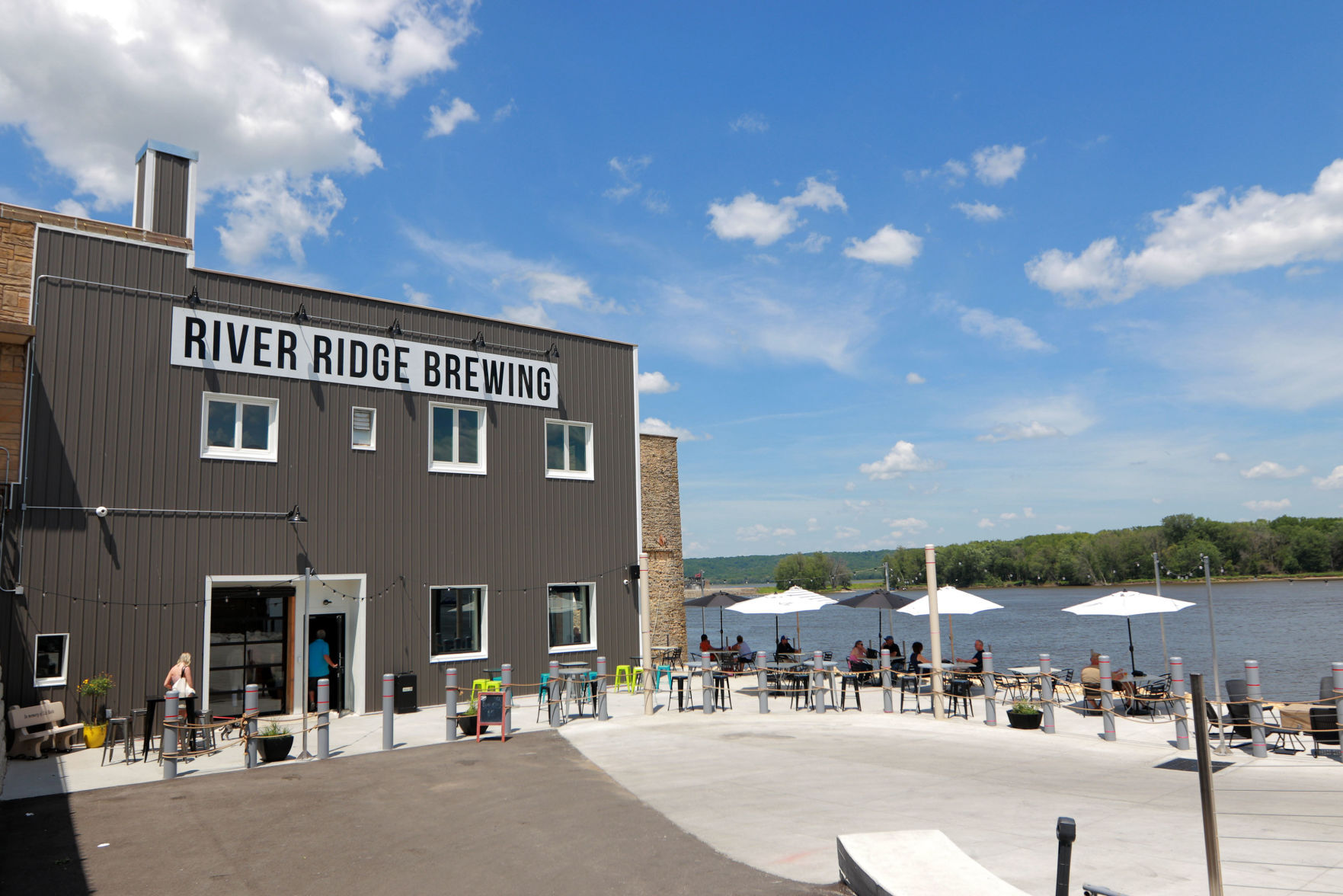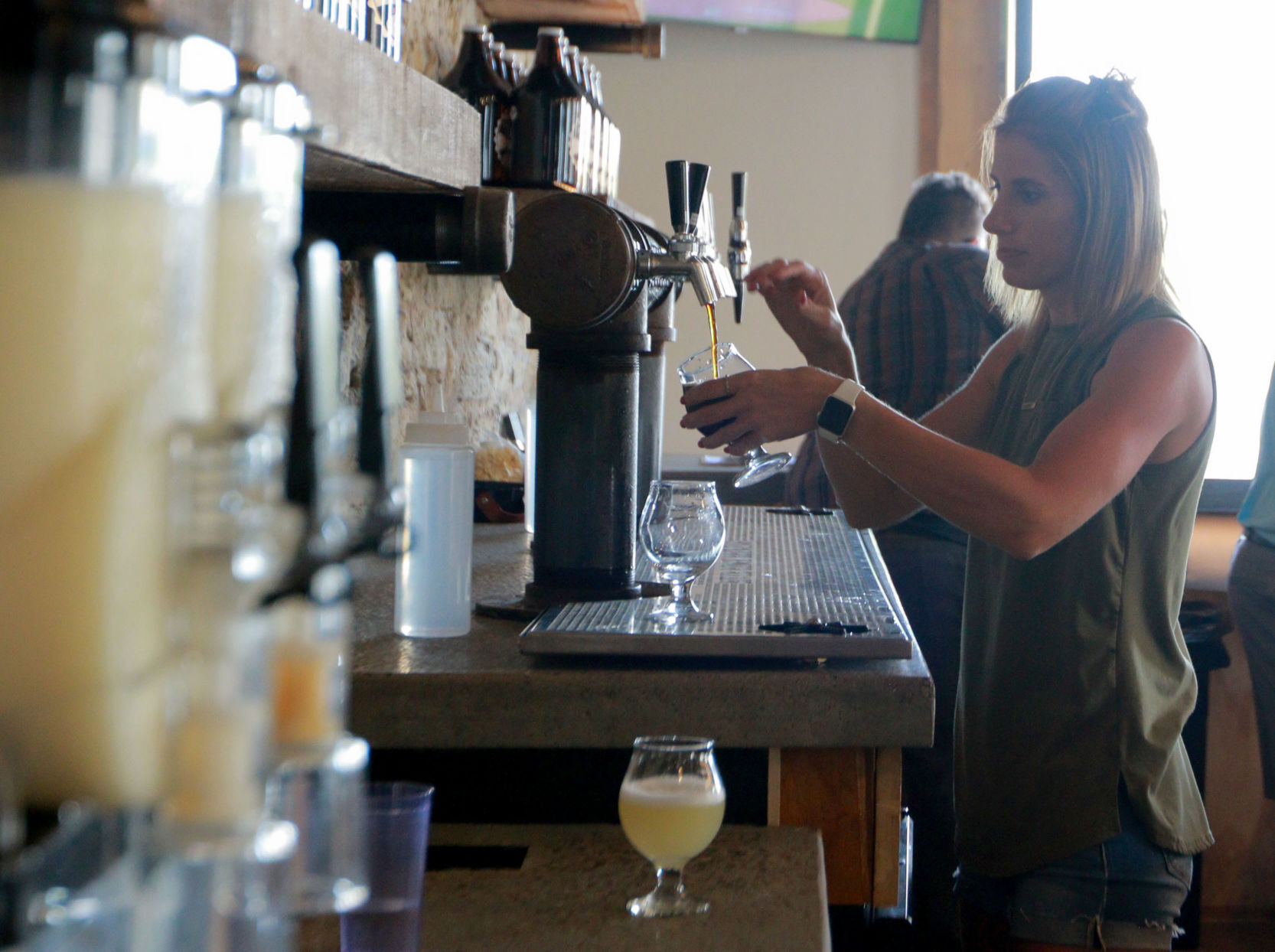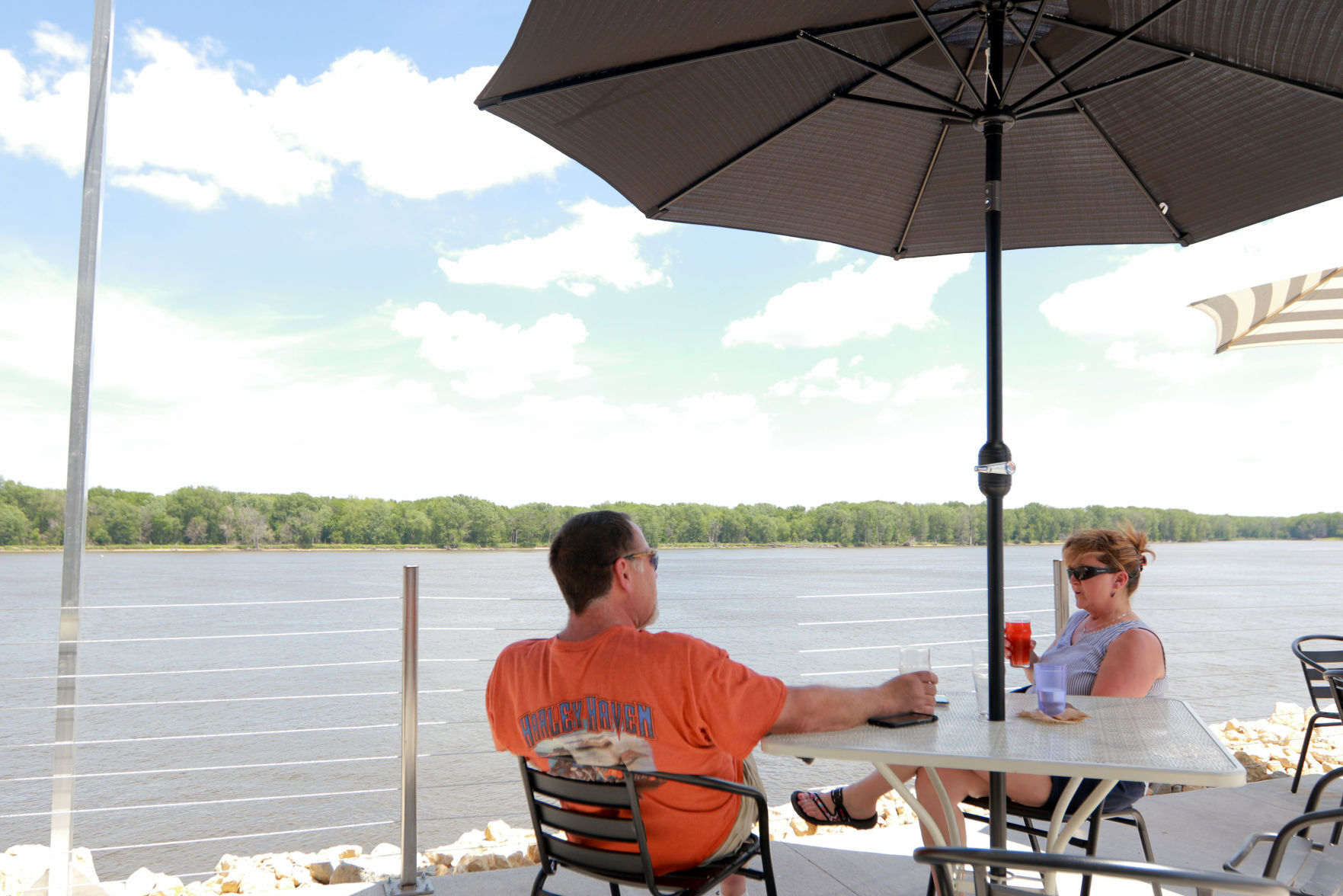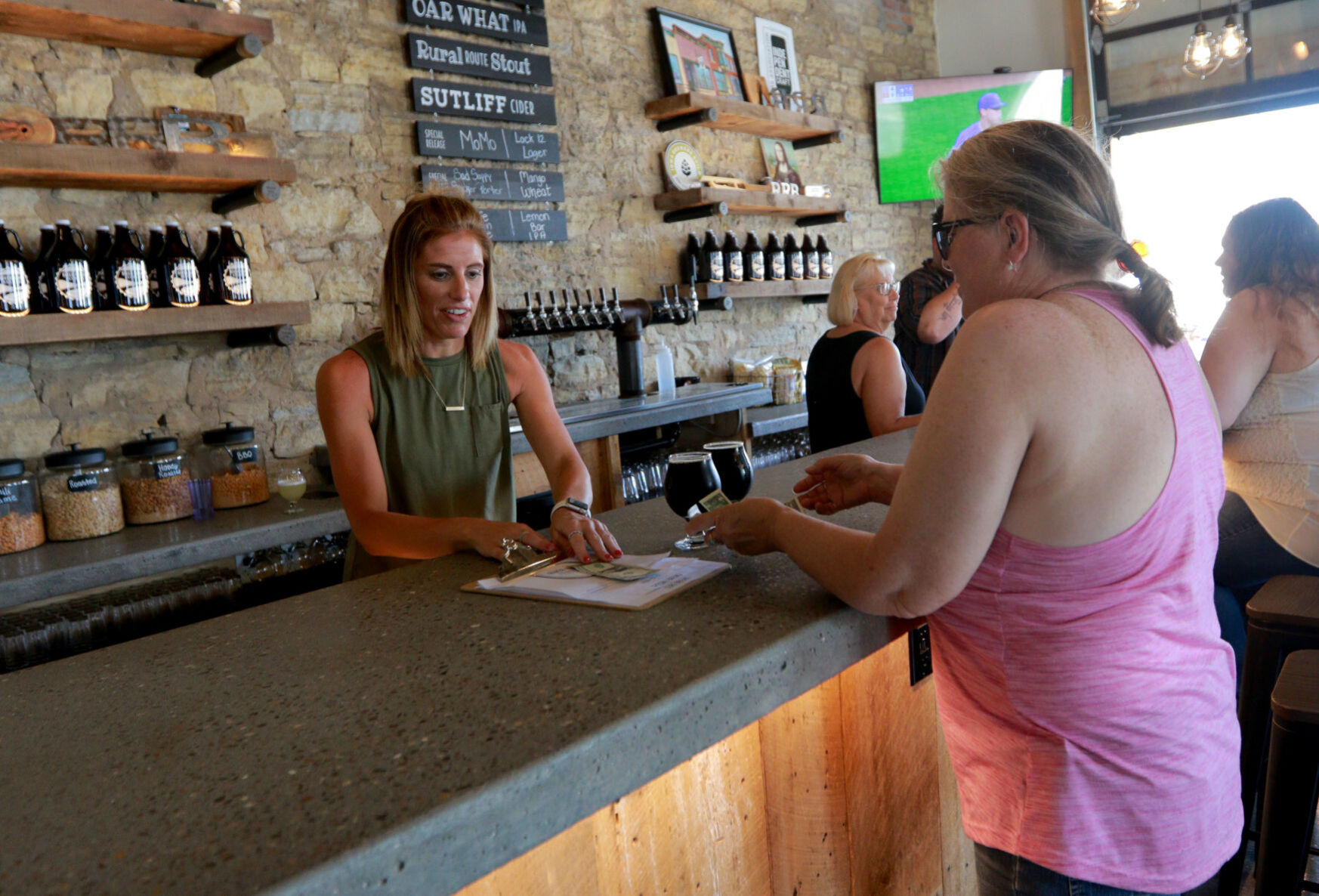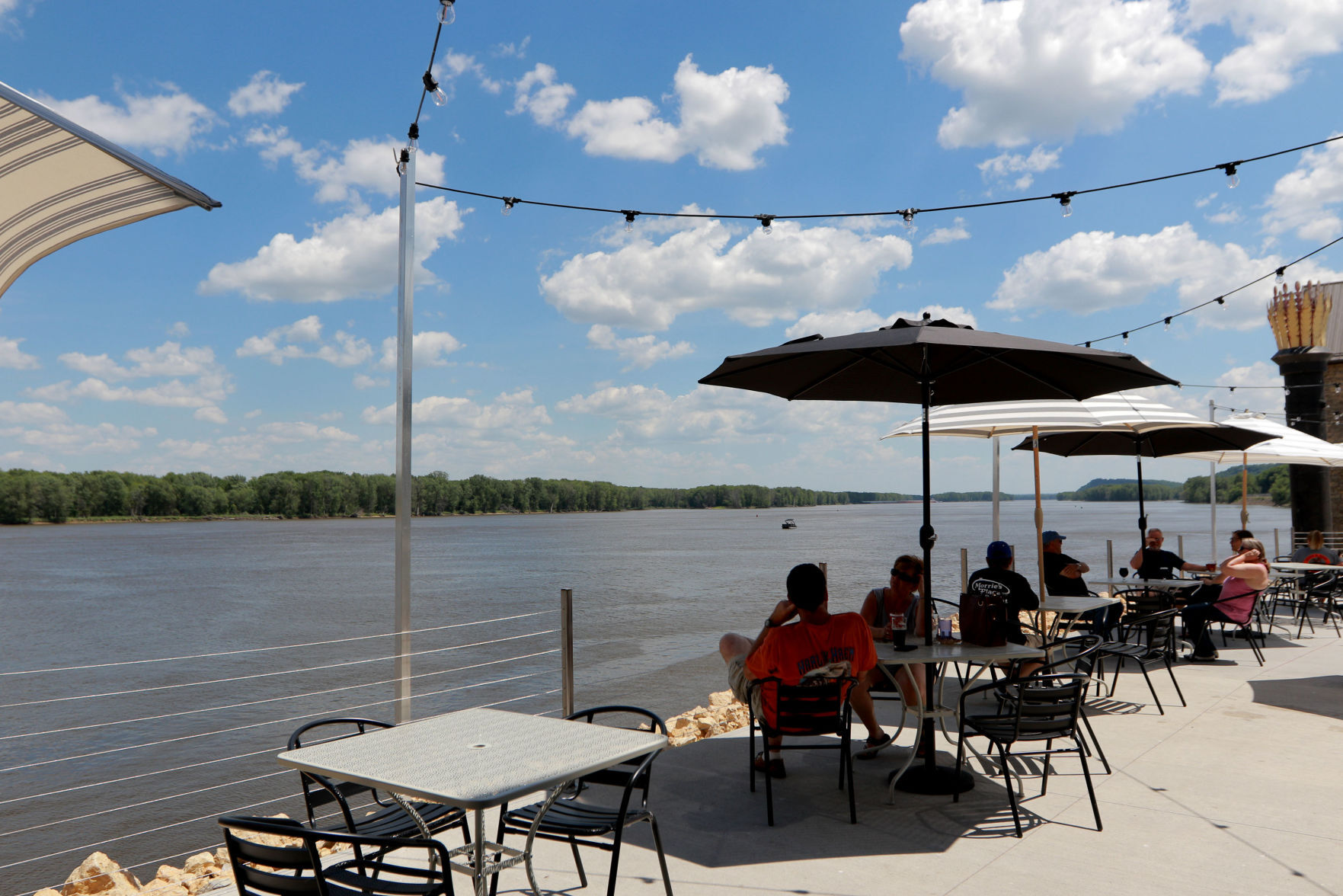Even before the temperatures warmed, it had become abundantly clear that River Ridge Brewing’s new location was going to be a hit.
The Bellevue, Iowa, brewery first opened its doors at 303 S. Riverview St. in early April, recalled co-owner Nic Hockenberry. The new location offers up-close views of the Mississippi River, including a patio that puts customers right on top of the water.
Even on those blustery, cloud-covered spring days, visitors flocked to the outdoor seating.
“Regardless of the weather, people were out on the patio,” Hockenberry recalled with a laugh. “It has been full every weekend.”
Two months after its opening, the new home of River Ridge Brewing is exceeding expectations. But Hockenberry admits there were growing pains along the way.
The ownership team at River Ridge Brewing had anticipated 2020 would be its biggest year yet. And the hope was that its original location would bring in a steady stream of revenue as it invested in the new one.
“That plan was kind of thrown into disarray,” he recalled. “We basically had to shut down the old location last year (because of the pandemic). We were devoting all our efforts to the new one.”
The struggles River Ridge faced in 2020 — and the renaissance that it is experiencing this year — are a microcosm of the recent path traveled by small breweries in the tri-state region, as well as the United States as a whole.
Despite the challenges they faced in 2020, a trio of local breweries last week announced upcoming expansion plans.
Dimensional Brewing Co. has purchased the neighboring property on Main Street in Dubuque and plans to use it for an additional taproom and event space. Dubuque-based 7 Hills Brewing Co., meanwhile, announced its intention to open “7 Hills North” in Platteville, Wis., in about two months.
Meanwhile, Potosi (Wis.) Brewing plans to launch the first of a three-phase expansion plan this week.
The growth presents encouraging news after the pandemic stunted the growing craft beer industry.
An annual production report released by The Brewers Association, the trade association representing small and independent American craft brewers, showed that beer production by the country’s small and independent brewers declined by 9% in 2020. This represented the first decline in at least five years.
Overall beer production in the U.S. fell by just 3% in 2020, illustrating how small breweries bore the brunt of the pandemic-related downturn.
The retail dollar value of the U.S. craft beer industry dipped by 22% in 2020 compared to the previous year, and industry jobs declined by 14%. Meanwhile, the inroads that small brewers had made in the industry as a whole began to recede: Craft brewers’ market share dipped to 12.3% in 2020, after reaching nearly 14% the prior year.
POSITIVE SIGNS
Midway through 2021, new statistics on craft brewing are not yet available. But there are already signs the industry’s arrow is pointing up.
At River Ridge Brewing, the crowded patio may be the most obvious snapshot of progress, but there are plenty of positive signs within the walls as well.
Hockenberry said the interior taproom is nearly four times as large as the brewery’s previous space. And additional room for brewing means River Ridge can triple its production capacity.
Hockenberry said he feels fortunate that River Ridge Brewing is emerging from the pandemic with a sense of momentum, adding that this isn’t necessarily the case for everyone.
“Across the nation, I think there are some breweries that went away (during the pandemic) and will not come back,” he said. “I think we were lucky in our area. We had a lot of strong breweries that were already looking to the future before COVID-19.”
Jubeck New World Brewing, located at 115 W. 11th St. in Dubuque, opened in the summer of 2014, ushering in the start of the local brewing phenomenon before the likes of Dimensional and 7 Hills came along.
That brewery has recently experienced the challenges of the pandemic and the sense of hope defining the future.
Co-owner Jay Jubeck said the brewery’s taproom was shuttered for roughly eight months due to COVID-19. During that time, customers could only enter to pick up beers and take them home, he said.
The taproom finally reopened to guests in November, but on a reservation-only basis, an arrangement that stayed in place throughout the winter. Jubeck New World Brewing finally removed its reservation requirement in April, representing a return to normalcy roughly 13 months after the pandemic had begun in the United States.
“It was a slow year,” Jubeck said. “We knew we didn’t have all the sales outlets we normally would, so we just scaled back to a comfortable level. We weren’t pushing as hard as we were before.”
Jubeck said that is finally starting to turn around, noting that “for the first time in quite a while” all of the brewery’s tanks are full and production is returning to pre-pandemic levels.
MOVING FORWARD
For Maquoketa Brewing, the pandemic turned 2020 into the year that never was.
Owners Mark and Judy Lyon had planned on opening the brewery last year, but a number of COVID-related delays made that impossible.
“The buildout of the space took longer than we’d expected. Workers had to be spaced out, and some of the equipment was harder to get,” Mark said. “When we were finally ready to open, we had to look at the government restrictions and decide if there was enough seating allowed (in our taproom) to make it worthwhile to open.”
The brewery, located at 110 S. Main St. in Maquoketa, Iowa, finally opened its doors in January.
After months of fluctuating sales levels, Lyon said things are taking what appear to be a permanent turn for the better. More tables have been opened in the taproom, people are permitted to sit at the bar and customers seem more willing to be out in public.
“Things feel a bit more normal now,” he said. “The atmosphere is more festive.”
Mark and Judy are so confident, they have chosen to expand. Work has commenced on a neighboring space within Maquoketa Brewing’s current building.
Mark said the brewery plans to open the additional space in July and use it for special events, as well as additional room for those visiting the taproom.
Other craft breweries believe that the harsh realities of the pandemic ushered in permanent changes that could help small brewers in the long run.
Tom and Carol Olberding opened Textile Brewing Co. in Dyersville, Iowa, in 2019.
The pandemic was a shock to the system for a business still in its infancy, Tom admitted. But the Olberdings quickly started making the necessary changes to keep the business going.
“I think it forced us to reinvent ourselves a bit,” Tom said. “We got a manual canning system and started doing takeout and curbside pickup. We did online ordering, which is something we didn’t offer before.”
After months of ups and downs, influenced in large part by the ebbs and flows related to the spread of COVID-19, Tom said business is on the upswing. He noted that Textile Brewing is now doing more sales than it had been pre-pandemic.
The brewery also is positioning itself for long-term growth.
Textile Brewing recently opened a location in Cascade, Iowa, dubbed Corner Taproom.
It’s also making some changes to its original location. Tom said Textile is expanding its kitchen and purchasing an additional fermenter to increase its brewing capacity.
With the end of the pandemic in sight, the Olberdings are bullish once again about the long-term prospects of their business. And they believe some of the innovations they made along the way could have long-term benefits.
“Some of those things we did last year, we were just trying to stay afloat at the time,” Tom said. “In the end, though, I think these things will make us a more viable business going forward.”


